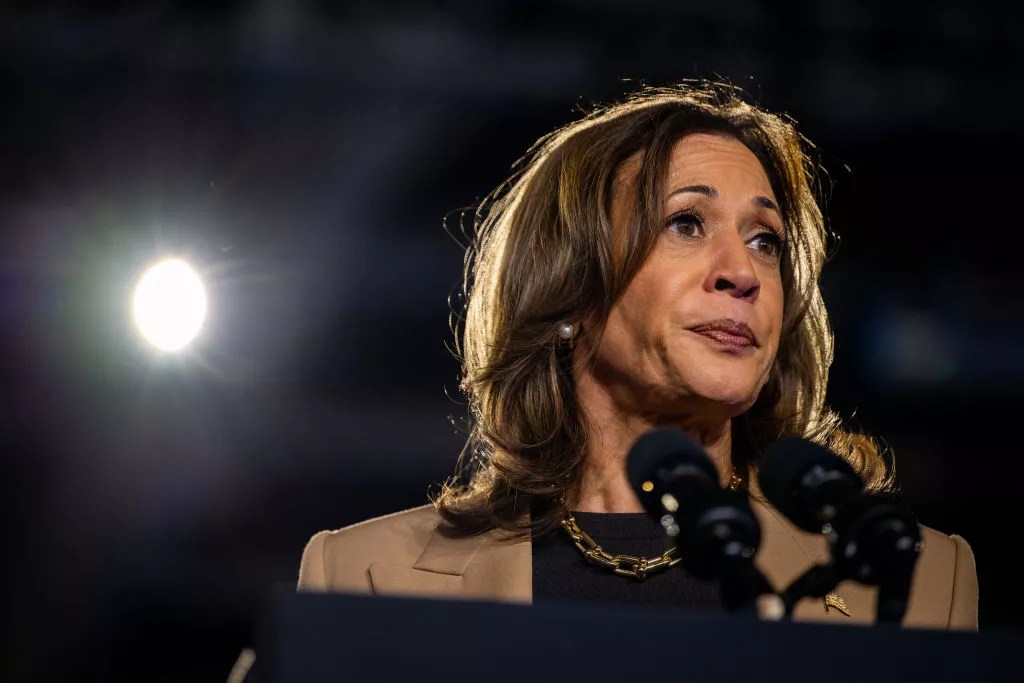
Brandon Bell/Getty Images

Audio By Carbonatix
The effort to win Arizona for Kamala Harris was massive.
In the four months after Harris inherited the Democratic nomination from President Joe Biden, Democrats and affiliated groups spent millions of dollars on campaign staff, celebrity appearances, rallies, TV ads and more.
Apparently, it was nowhere near enough. On Tuesday, Harris lost resoundingly to former and now-future President Donald Trump. Though ballots are still being counted in Arizona, which has not yet been called, it will hardly matter. Trump is likely to win the state, and after sweeping other battleground states, he didn’t need Arizona’s 11 electoral votes anyway.
Now, after maintaining a facade of optimism leading into the election, many Arizona political strategists and community organizers say they aren’t surprised.
“My gut feeling, which I was trying to keep to myself, was that this was not an unlikely scenario,” said Chuck Coughlin, the president and CEO of Republican political consulting firm HighGround Inc. “I wanted to be hopeful, and I wanted to be optimistic, but underneath that, there was a deep skepticism about what was happening.”
Belén Sisa, a progressive political strategist, agreed.
“I was hoping for the best,” she said, “but preparing for the worst.”
Entering Election Day, polls showed Trump leading Harris in the state by four points. Still, many strategists felt the race was the Democratic Party’s to lose. In hindsight, they point to President Joe Biden and a lack of a unifying campaign message as reasons for Harris’ loss.
The criticism of Biden for taking too long to drop out of the race is nothing new. Yet Republican strategist Paul Bentz, also of Highground, sees it as perhaps the biggest contributor to Harris’ loss. Jumping into the race late “was always going to be a difficult tightrope act” for her, Bentz said.
“Harris couldn’t have run a flawless campaign,” added Azza Abuseif, the executive director of the Council on American-Islamic Relations Arizona, “considering the fact that she only had a few months to plan for this campaign.”
At the same time, Harris had trouble distancing herself from Biden – and, in some cases, declined to do so. “Harris may have had a better chance of winning had she not been tied to the Biden administration,” Abuseif said.
As Americans continued to struggle to pay for housing costs, groceries and basic necessities – despite positive indicators throughout much of the economy – Biden’s unpopularity became his vice president’s burden. It may have cost Harris the presidency.
“The burden she faced of carrying the Biden torch was a deficit position for her to begin with,” Coughlin said.

Azza Abuseif, the executive director of the Council on American Islamic Relations of Arizona, said Kamala Harris “may have had a better chance of winning had she not been tied to the Biden administration.”
Katya Schwenk
No North Star?
Still, when Harris first took over the party’s ticket, energy was high. Harris adopted a strong message of protecting democracy and the Constitution and valuing “country over party,” contrasting herself with Trump, who spurred on the Jan. 6 attacks and tried to overturn the 2020 election.
Whether that tack was the right one depends on who you ask.
A never-Trump Republican, Coughlin found the defending democracy stuff persuasive. “Then it disappeared,” he said. Instead of identifying a unifying narrative that “had the potential to draw larger parts of the county together,” he said, Harris’s campaign devolved into “a typical Democratic groping session around grievance. You need to have a North Star.”
Meanwhile, Harris’ opponent had his North Star message down loud and clear. “He’s just ‘Everybody’s against us,'” Coughlin said of Trump’s messaging. “It’s the world against America.”
But for Sisa and others, Harris did little to explain her appeal to voters beyond noting how unappealing Trump was. She had a strong message of not being Trump, relying on the slogan “We’re not going back.” But Sisa said Harris didn’t “give us something to fight for” rather than fight against.
Some communities Harris needed to rally felt unheard, either flocking to Trump or voting third party. Nationally, Trump increased his support among Latino voters and specifically Latino men compared with 2020. According to exit polling, 46% of Latino voters nationwide cast their ballots for Trump this year, an increase from 32% four years ago.
Progressive community organizer Sarah León said communities that the Democratic Party are “so used to accessing and having secure support from (are) not so secure.” Instead, these groups increasingly view Trump as an option, in Arizona and elsewhere.
“From the very beginning, she should have leaned into her base,” Sisa said, citing issues such as immigration and Israel’s war in Gaza as weak points and missed opportunities for the vice president. “She should have listened to Latinos, to Arab voters, to young voters and their demands.”
Meanwhile, Republicans attacked Harris in the state over immigration and the economy, which Bentz said “seemed to be very effective. Democrats didn’t really have a good response to those items.”
And while Harris boasted a host of celebrities at campaign appearances – Jessica Alba, Bryan Cranston, George Lopez and more – León found them “over the top and really showy,”
“I can’t pay my rent, or I can’t do these really basic things, and now you have all these celebrities coming out, who are very wealthy, saying you should vote for this person over here,” León said. “To me, that doesn’t feel like necessarily the best route. Do they understand what people are really looking to hear?”

Though Kamala Harris actively courted moderate Republicans, exit polling from NBC News showed that nationally, 94% of Republicans “voted red” in 2024, the exact same percentage as four years ago.
Joe Raedle/Getty Images
Courting Republicans
Instead, Sisa argued, the Harris campaign focused more on gaining the votes of moderates and Republicans, which proved to be unsuccessful.
While that Republican crossover appeared stronger in earlier polling, it dropped by more than half as the election neared, Bentz said. Exit polling from NBC News showed that nationally, 94% of Republicans “voted red” in 2024, the exact same percentage as four years ago.
Still, Bentz and others thought the contest between Trump and Harris would be closer. It wasn’t. In a movement that Coughlin called an “overwhelming stampede through all the battleground states,” crucial electoral votes in Pennsylvania, Michigan, Wisconsin and Georgia went to Trump.
It wasn’t just Harris who struggled. Democrats lost ground across the board. Republicans gained control of the U.S. Senate and currently hold the lead in the U.S. House.
In Arizona, which is still counting votes, many races remain undecided. While Democratic Rep. Ruben Gallego will likely hold off Republican Kari Lake for a seat in the Senate, and while Proposition 139 passed to protect abortion in the state, Republican-backed Propositions 314 and 312 – which target immigrants and the unhoused, respectively – comfortably passed. Additionally, Democrats might not flip the state legislature, saddling Gov. Katie Hobbs with an adversarial Arizona House and Senate.
Now, as community organizers and activists prepare for another Trump presidency, they feel “this chilling uncertainty,” Abuseif said. Trump will be worse for many vulnerable communities than Harris would have been. But she said they’re prepared to put up a fight against mass deportations or “Muslim bans.”
“We are 100% going to fight this,” Abuseif said. “We’re gonna resist for sure, to any Muslim bans, anything that threatens any of the marginalized groups.”